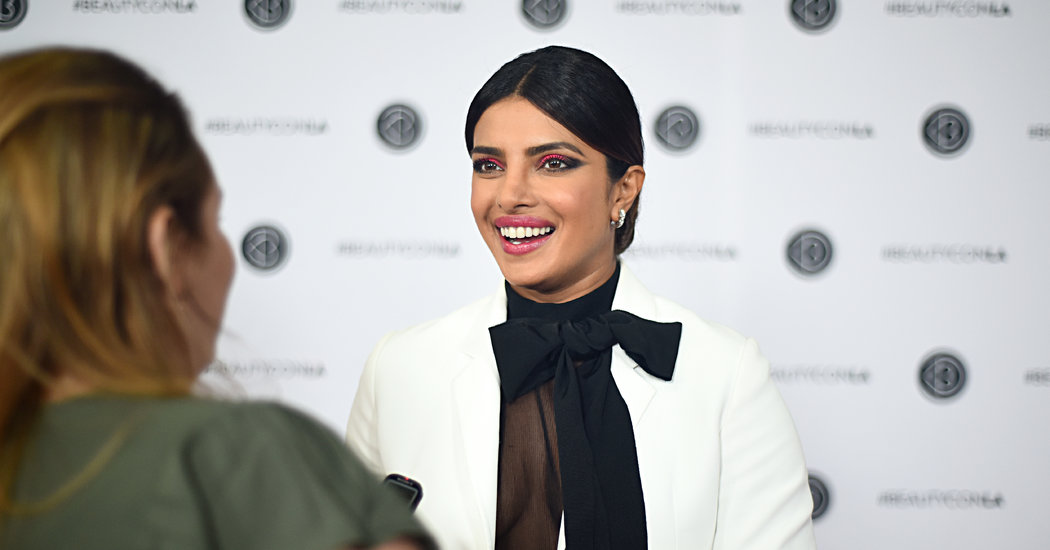
When the actress Priyanka Chopra stepped onstage this weekend to speak in Los Angeles at Beautycon, the cosmetic industry’s traveling more-than-a-trade-show event, she might have been prepared to answer questions about her self-care regimens, her husband (the pop star Nick Jonas), the unreasonable standards to which women’s bodies are held or her humanitarian work with UNICEF.
What she surely did not anticipate was a confrontation by a Pakistani-American woman who accused her of being a “hypocrite” for tweeting support for the Indian Armed Forces.
The testy exchange between Ms. Chopra and Ayesha Malik, a 28-year-old beauty influencer from Anchorage, took place during what was billed as a “fireside chat” with Ms. Chopra, where she was to discuss global beauty standards, female empowerment, “everyday philanthropy” and “the responsibility that comes with being in the spotlight” with the founder and C.E.O. of Beautycon, Moj Mahdara.
After the floor opened to questions from the audience, Ms. Malik criticized Ms. Chopra over a Feb. 26 tweet that read “Jai Hind” (“Long Live India”) and “#IndianArmedForces.”
The tweet in question came at a time of heightened tensions between Pakistan, which is majority Muslim, and India, which is majority Hindu.
“It was kind of hard hearing you talk about humanity because as your neighbor, a Pakistani, I know you’re a bit of a hypocrite,” Ms. Malik said. “You’re a UNICEF ambassador for peace and you’re encouraging nuclear war against Pakistan. There’s no winner in this.”
While she was speaking, Ms. Malik’s microphone was taken away.
Ms. Chopra asked if Ms. Malik was done “venting,” and then responded that while she doesn’t support war, she does support India.
“I have many, many friends from Pakistan, and I am from India, and war is not something that I’m really fond of but I am patriotic,” Ms. Chopra said. “So I’m sorry if I hurt sentiments to people who do love me and have loved me, but I think that all of us have a sort of middle ground that we all have to walk.”
On Feb. 14, a suicide bombing by an Islamic militant killed dozens of Indian soldiers in Kashmir, a contested region between India and Pakistan. India accused Pakistan of being behind the attack and responded with a February 26 airstrike near the Pakistani town of Balakot. (A Pakistani militant group later took credit.) Chopra’s tweet was in response to the airstrike.
Ms. Malik, an influencer known for her lush head of dark curls, said she didn’t attend Beautycon to confront Ms. Chopra. (She was looking forward to seeing Tina Knowles-Lawson, the mother of Beyoncé Knowles-Carter and Solange Knowles, who also spoke at the event on Saturday.)
But she said that while she was walking by the main stage, she heard Ms. Chopra discussing her humanitarian work and it struck a nerve. Ms. Malik said her extended family lives in Lahore, Pakistan’s second largest city, and she feared for the safety of her relatives as tensions escalated.
“The reason why it was more upsetting seeing Priyanka Chopra’s tweet compared to the hundreds of other Bollywood actors who also tweeted word for word the same thing, was because she’s Mrs. Jonas, she’s Miss World, she’s in ‘Baywatch,’ she was in ‘Quantico,’” Ms. Malik said.
In a statement, Ms. Mahdara said: “We are a community that does not always agree with each other, but Beautycon wants candid conversations to take place to push towards tolerance and education. Priyanka handled the situation with respect and we are grateful to her.” Representatives for Ms. Chopra did not return a request for comment.
The confrontation over the weekend drew attention to both Ms. Chopra’s tweet and the larger conflict between India and Pakistan. On Aug. 5, the Indian government unilaterally ended Kashmir’s autonomy and cut internet and phone lines in the region. Kashmir, a predominantly Muslim region that sits between India and Pakistan, has long been contested by both countries.
Indian film stars and other public officials often express nationalistic statements, said Tejaswini Ganti, an associate professor of anthropology at New York University who has written two books on India’s film industry.
“The expression of patriotism is pretty common and it’s not unusual,” said Ms. Ganti, adding that patriotic statements don’t necessarily mark public figures as following a specific political ideology.
Ms. Chopra also has a personal connection to the Indian Armed Forces: both of her parents were officers in the Indian Army. Before her recent success in the American entertainment industry — she starred in “Quantico,” which ran for three seasons on ABC, and has been in numerous movies, like the 2017 remake of “Baywatch” — Ms. Chopra was already one of Bollywood’s most popular celebrities.
It hasn’t insulated her from backlash and criticism in India. Last year, she apologized for acting in a plotline in “Quantico” about terrorism by Indian nationalists. “I’m a proud Indian and that will never change,” she wrote on Twitter.
In the past, Ms. Chopra has also been criticized in India for showing her legs during a meeting with Prime Minister Narendra Modi, exposing her armpits in a photo spread for Maxim magazine and visiting Rohingya refugee camps in Bangladesh. She has been a global UNICEF Goodwill Ambassador for child rights since 2016.
For Ms. Malik, confronting Ms. Chopra was a return to her roots as an activist. While getting her undergraduate degree at Eastern Washington University in Cheney, Wash., she worked with the Spokane Interfaith Council, which helps religious minorities in the wake of hate crimes.
“I did not do this for fame. I’ve always had an audience, and I never utilized it because I literally don’t care,” Ms. Malik said. “What I said, I said it because if I didn’t nobody else would have.”







